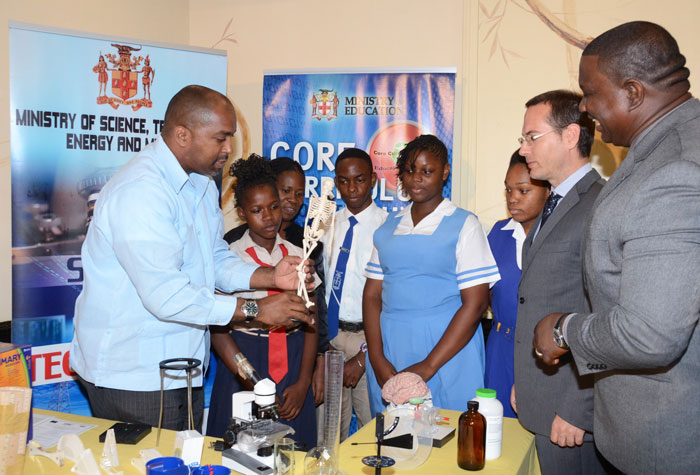EU Outfits Science Labs at Eight Primary and Secondary Schools
By: , June 30, 2015The Key Point:
The Facts
- The provision comes under the $35 million Improving Innovation Capacities in the Caribbean (INVOCAB) Project, which is being managed by the Scientific Research Council (SRC).
- The beneficiary schools are: Whitfield All Age and Seaward Primary and Junior High in Kingston; Bull Bay All Age and Yallahs High School in St. Thomas; Windsor Castle All Age in Portland; Islington High and Carron Hall High in St. Mary, and Greater Portmore High in St. Catherine.
The Full Story
The science laboratories of eight primary and secondary schools have been fully equipped, following donation of tools and supplies valued at over US$8, 000, by the European Union (EU).
The provision comes under the $35 million Improving Innovation Capacities in the Caribbean (INVOCAB) Project, which is being managed by the Scientific Research Council (SRC).
The beneficiary schools are: Whitfield All Age and Seaward Primary and Junior High in Kingston; Bull Bay All Age and Yallahs High School in St. Thomas; Windsor Castle All Age in Portland; Islington High and Carron Hall High in St. Mary, and Greater Portmore High in St. Catherine.
The items provided include test tube racks and brushes, Bunsen burners, tripod stands, cavity slides, human tissue and cell development slides, human skeleton models, heart and brain models, measuring cylinders, funnel sets, Petri dishes, microscopes, forceps, and evaporating dishes.
Speaking at the handing over ceremony held at the Courtleigh Hotel in New Kingston on June 29, Minister of State in the Ministry of Science, Technology, Energy and Mining, Hon. Julian Robinson, expressed appreciation to the EU for the donation.
He said that the equipment will assist the schools to improve their performance in the Science, Technology, Engineering and Mathematics (STEM) subjects.
“Those are the subjects that will actually uncover the innovations, come up with new ideas that can actually translate into new products and services, which can grow us out of the economic challenges that we have,” Mr. Robinson noted.
For her part, Project Manager, INVOCAB, Kerry-Ann Curtis, encouraged the schools to take care of the items provided.
“Do not store them in the principal’s office, but do not leave them around carelessly either. Work out a schedule, create a log book and ensure accountability for the return of the items after use,” Ms Curtis urged.
Trade Officer, Delegation of the EU to Jamaica, Koenraad Burie, said that the INVOCAB project will place “great emphasis” on improving the competencies of teachers, in the transfer of knowledge to their students.
“It will also focus on developing material, training and establishing clubs, which will work simultaneously to improve the students’ capacity to understand science,” Mr. Burie pointed out.
INVOCAB aims to increase appreciation of science, technology and innovation among the nation’s youth by outfitting science laboratories, establishing science centres, engaging teachers in professional development workshops, and hosting science summer camps for teachers.
The aim is to realise at least a 10 percent improvement in the examination results of the participating schools in the areas of Mathematics and General Science at the primary level, and Mathematics, Chemistry, Physics, Biology, Integrated Science, Agricultural Science and Information Technology, at the secondary level.


